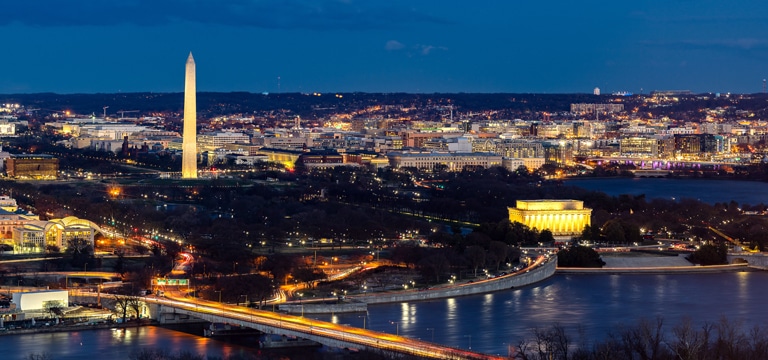Editor’s note: This article was written by Ethan McLeod and was originally published via Outlaw Report. It has been republished with permission.
Unlicensed cannabis businesses operating in the District of Columbia’s gray market can expect more inspections and heightened regulatory scrutiny after the end of Labor Day weekend.
Tuesday, September 6 marks the launch of inspections by the new Cannabis Joint Task Force, as well as the end of a 30-day grace period for businesses announced last month by the Alcoholic Beverage Control Administration. The task force, made up of 10 local regulatory and law enforcement agencies, will be inspecting cannabis “gifting” shops across the District for operating licenses and tax, building and health code compliance beginning September 5.
“Regulatory agencies regularly conduct inspections at businesses under their authority to ensure awareness of and compliance with DC laws and regulations,” said ABRA Chief of Staff Jared Powell in an email to The Outlaw Report. “The upcoming joint inspections represent District Government agency’s [sic.] efforts to more closely collaborate together on compliance and education initiatives.”
ABRA did not make officials available for an interview for this report.
The start of inspections by the task force marks the latest move by D.C. government to address a sizable, unregulated gray market that has evolved in the eight years since voters legalized cannabis possession, growing and gifting for adults by approving Initiative 71. While D.C. remains legally barred from taxing and regulating cannabis under a budget rider included annually in the federal budget approved by Congress, businesses for years have taken advantage of a loophole to “gift” cannabis to customers who purchase a non-cannabis item or service.
Many I-71 entrepreneurs view the task force as a new step by local government to punish businesses working within the limited space afforded by D.C. and federal laws — and one that has included sparse communication between agencies and business owners about what to expect during forthcoming inspections.
“We’re not sure what to fear because they haven’t really listed out guidelines,” said Mackenzie Manns of the Generational Equity Movement, a coalition of seven Black-owned cannabis businesses in Washington. “This doesn’t seem like they’re working to bring us into conversations. It does follow a similar trend, that they are trying to crush small businesses.”
Last month’s task force announcement followed multiple attempts by D.C. Council Chairman Phil Mendelson over the past year to crack down on gray market companies with legislation that would have imposed heavy fines, revoked business licenses and shuttered storefronts. Following public backlash, Mendelson scrapped such language in a bill he had initially proposed last October. Then, in April, the Council rejected another bill that would have allowed for increased regulatory enforcement against such businesses after pushback from I-71 business owners, who argued punishments would disproportionately harm Black entrepreneurs. The Council subsequently passed a law in June allowing D.C. residents to “self-certify” as medical patients — without also increasing enforcement actions against gray market businesses — to help support the city’s limited medical cannabis market that has struggled with competition from gray market operators.
The new Cannabis Joint Task Force includes ABRA, the District’s Departments of Consumer and Regulatory Affairs (DCRA), Fire and Emergency Medical Services (FEMS) and Health, as well as the Office of the Attorney General for D.C., the Metropolitan Police Department, the Office of Tax and Revenue, and the Department of Forensic Science. ABRA will be serving only as a coordinating agency, Powell noted — its enforcement duties are limited to businesses licensed to produce and sell alcohol and medical cannabis, he said — while the inspectors will be from the Health Department, DCRA, and FEMS.
Regular inspections at businesses will aim “to ensure awareness of and compliance with DC laws and regulations,” Powell said. The Office of Tax Revenue will also be reviewing business registrations independently, but its personnel won’t accompany inspectors on visits. The Department of Forensic Science will test items seized during inspections.
A newly published investigation by Capital Community News, supported by the investigative journalism grant-making organization Spotlight D.C., identified 60 I-71-operating storefronts citywide, and determined roughly half are operating without a Basic Business License and 25 businesses lack a Certificate of Occupancy.
Asked whether MPD will be shifting its enforcement approach for I-71 businesses, public affairs specialist Alaina Gertz said that while the task force’s focus “is on administrative violations under the jurisdiction of other agencies, they will refer any potential criminal matters to MPD.”
Some operators have said they feel threatened by a lack of dialogue between the task force and businesses leading up to August task force announcement or the end of the grace period next week. In a statement to The Outlaw Report, the I-71 Committee, a coalition representing D.C. cannabis “gifting” businesses, said in a statement that “District businesses continue to be in the dark as to what the goal and motivation is behind ABRA’s intentions to single out only I-71 businesses for investigation and enforcement.
“There is no discernible threat that ABRA is responding to nor is there any likely benefit to public safety, to the District’s economy, or to the quality of life of District residents. Shuttering our doors will only result in additional public safety concerns,” including more pop-up cannabis retail events (rather than established brick-and-mortar businesses), disruptions to business leases and displacement of companies and workers.
Such effects would be “ultimately, leaps backwards in cannabis legislation progress, which on a national level is only moving forward,” the I-71 Committee said.
Manns, of the Generational Equity Movement, said shops in GEM’s coalition support government monitoring businesses for compliance with local laws.
“We want to be part of a regulated industry, and the businesses involved in [GEM] have worked hard to make sure that their businesses are operating within the standards that D.C. sets out for small businesses,” she said.
However, operators remain uncertain about what inspections will look like at this point, as well as their implications if a company is fined or referred for further investigation — particularly if an operator hopes to apply for licensure if D.C. is eventually allowed to set up a regulated market.
“I think the fear comes more from the unknown, that we don’t entirely know,” Manns said.
Asked about such future implications if regulation of a legal market moves forward, Powell said “warnings and citations are an administrative function and will not affect applicant eligibility.”
ABRA this month will be issuing its first set of medical cannabis business licenses since the agency took over regulation of the city’s medicinal market from the Department of Health in 2020. On September 28, ABRA plans to award five new licenses: two new cultivation centers; one dispensary, to be located in either Ward 3 or 5, and two testing labs.
Get daily cannabis business news updates. Subscribe
Have an additional perspective to share? Send us a message to let us know, and if your comment is chosen by our editors it could be featured here.
Perspective to add? Suggest a revision or submit commentary for review using the form below.
Note: our editors approve comments that provide new and succinct insight to our audience. If your comment is chosen for publishing, it will appear at the end of the article along with your name, job title, and organization. If you have a profile in the Ganjapreneur Business Index, your comment will also include a backlink for reference. If you are suggesting a correction, we will look into the issue further.
End



